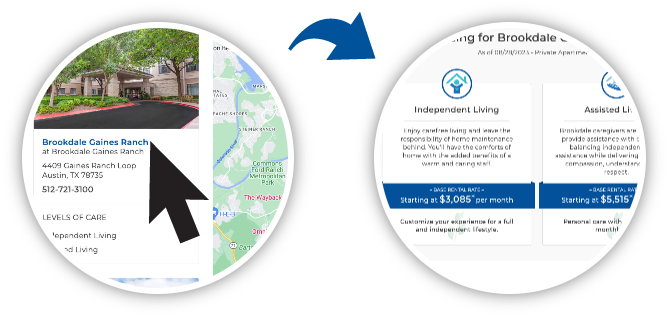- Home
- Healthcare Professional Referrals
- Blogs
- When Weight Gain Can Be Good for Seniors
1. When seniors have a loss of muscle mass
A common condition that occurs as seniors get older is sarcopenia: the loss of muscle mass and muscle quality. Fat is also redistributed from the limbs to the middle of the body during this process. Sarcopenia can contribute to impaired daily living activities, disability, and frailty. Approximately 25 percent of all weight lost in older adults during intentional weight loss interventions is fat-free mass, which contributes to sarcopenia. This noticeable thinness can potentially be problematic, as it contributes to frailty and therefore increases the risk of injury due to falls or other accidents.
As Carl Lavie, obesity researcher and author of The Obesity Paradox, recently told KFF Health News, maintaining muscle mass is more important than losing weight for overweight older adults. That’s because the less muscle mass one has, the more prone to injury they are. For older women, weight loss is associated with 1.8 times the risk of hip fracture; meanwhile, men over the age of 50 who experience a 10 percent loss in body weight are also at increased risk of the same injury*. So a little excess weight can actually prevent more serious injuries, especially for people in their 80s.
To protect seniors from losing muscle mass, it’s important to have a good exercise routine. The Centers for Disease Control and Prevention (CDC) recommends at least 150 minutes of moderate to intense activity per week for older adults, along with two days a week of activities that strengthen muscles, plus balancing exercises. At Brookdale, we encourage seniors to follow these guidelines by keeping our residents moving. Our B-Fit program uses research in physical health to help residents build an exercise routine that aligns with their individual goals, needs, and preferences. Our residents can pick from a variety of exercises to build muscle and burn fat. From chair yoga to weightlifting to tai chi, B-Fit encourages our residents to get stronger while enjoying the endorphins of exercise.
2. When seniors have a nutritional deficiency
A person’s weight is a result of a host of factors, including calorie intake, activity level, and overall health. But a lesser-known contributor to weight is one’s ability to absorb nutrients from the food they eat. Unintended weight loss can be a sign of a greater health issue, such as nutritional deficiency or malnutrition. Experts agree that if an older adult has lost more than 5 percent of their weight in six to 12 months, they should undergo a medical evaluation.
As seniors age, they face a greater likelihood of developing acute and chronic diseases, which are the most cited cause of malnutrition in developed countries. This can happen for a variety of reasons, including gastrointestinal discomfort or dental issues that discourage people from eating enough. Because of this, older adults have a high likelihood of being at nutritional risk or becoming malnourished. Malnutrition may lead to sarcopenia, frailty, fatigue, impairment, decreased immune function, increased risk of infection, and exacerbation of already occurring diseases. So having a little extra weight can serve as a buffer against these moments when unintentional weight loss may occur.
At Brookdale, we pay attention to the weight loss and weight gain of our residents to help them maintain their optimum physical health. Through our Nutrition At-Risk program, we regularly monitor our residents’ weight and BMI to track changes that may indicate a decline. Should a resident experience a sustained change in weight, we contact their medical provider for timely and appropriate interventions. We also work with our residents and their providers to develop and execute a nutrition plan to help them achieve and maintain a healthy weight.
Diet plays a major part in supporting nutrition and preserving muscle mass. Some experts recommend that seniors eat at least 30 grams of protein at three meals per day. Others advise eating protein-packed smaller meals throughout the day or drinking protein shakes. No matter the approach, Brookdale believes that proper nutrition plays a critical role in aging well, and our dining program reflects that philosophy. Meals feature whole grains, lean meats and poultry, fish, low-fat dairy, and a wide variety of fruits and vegetables.
3. When seniors have chronic conditions
It all goes back to ideal body mass index (BMI). Although BMI has been the standard measurement tool for years for determining a person’s healthy weight, it has a problematic history. In fact, recent evidence from the American Medical Association (AMA) suggests that BMI should not be solely used to diagnose obesity. According to the AMA Council on Science and Public Health report, BMI is an imperfect way to measure body fat because it does not account for differences across race/ethnic groups, sexes, genders, and age-span. A new policy based on the report suggests educating physicians on the problems of relying on BMI and finding alternative solutions for measuring and diagnosing obesity.
Research also indicates that BMI might be higher for seniors. “The BMI curve shifts to the right as you age, meaning higher weight is better in older age,” says Barbara Nicklas, professor of internal medicine at Wake Forest School of Medicine. This is explained by the “obesity paradox” — the reduction mortality risk for older adults with increased BMI.
In one study, older adults with the lowest risk of early mortality had BMIs of 27 to 27.9, which is considered “overweight” by World Health Organization (WHO) standards. In that same study, individuals who had the highest mortality risk were those who had a BMI under 22, which is considered “healthy weight” by the WHO.
The obesity paradox has been found to apply to chronic conditions such as heart failure, hypertension, coronary artery disease, and stroke. Findings suggest that weight gain can be a potential protective factor against these conditions, while some studies show that weight loss can even lead to mortality in older adults.
At Brookdale, we take a holistic approach to resident care. Our person-centered programs and clinical interventions help our residents avoid unnecessary hospitalizations through clinical and other nonmedical interventions. Through the application of healthcare methodologies, programs, and tracking outcomes, we assist our residents with chronic condition management and provide them with preventive care to meet their changing health needs, including fluctuations in weight.
At Brookdale, we want our residents to live their healthiest lives. To find out more about our approach to physical health and well-being, including exercise and nutrition, contact a representative today.
*Studies cited are inclusive of white women and men only and are not reflective of all demographics. Inclusive medical studies are not available at this time.
The above content is shared for educational and informational purposes only. You must consult your doctor before beginning any diet or exercise or fitness program, taking any additional or discontinuing any existing medications, or acting on any content on this site, especially if you have a medical condition. The content is not intended to be a substitute for professional medical advice, diagnosis, or treatment. Never disregard professional medical advice or delay in seeking it because of something you have read on our site.
Categories
- Alzheimer's & Dementia
- Caregiver's Corner
- COVID-19
- Health, Safety and Wellness
- Financial Well-Being
- Passion & Purpose
- The Journey to Senior Living
- Trending Now
- Socialization & Relationships
- Brookdale Solutions
- Brookdale Vision and Growth
Archives
View All
- November 2025
- October 2025
- September 2025
- August 2025
- July 2025
- June 2025
- May 2025
- April 2025
- March 2025
- February 2025
- January 2025
- December 2024
X
Let us help find the right community for you!
Complete the form and a Senior Living Advisor will be in touch!


